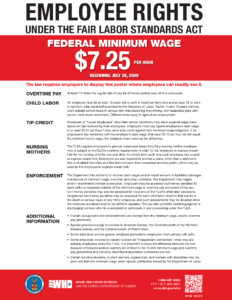Suppose they made the minimum wage $1,000 an hour. Just think: Every worker in America would be taking home at least $8,000 a day. That would be an annual salary of over $2 million.
Wonderful, right? What an easy way to abolish poverty and make everyone rich, right?
I think most people can see the fallacy of trying to end poverty in this manner. Businesses could not afford to pay all of their workers $1,000 an hour. If the government were to force them to do so, they would quickly go bankrupt.
How does the employer know how much to pay an employee? It is entirely subjective. He subjectively places a value on the employee’s work and then decides whether it’s worth it to him to pay that amount. The employee does the same thing. He decides whether the amount being offered is worth it to him. If they both agree that the amount is worth it, they enter into the deal.
The natural laws of supply and demand play a role here. If there is an extreme shortage of workers, the price for labor will go up because the employee has lots of job offers coming in. Some employers simply will not be able to pay what other employers are paying. Conversely, if there is an abundance of workers, the price being offered will tend lower.
Suppose an employer is paying his workers $10 an hour. That’s the value that the employer has subjectively placed on the work of the employee. Congress suddenly decides to raise the minimum wage to $1,000 an hour. What happens? At that point, the employer says to himself: “The employees’s work is not worth $1,000 an hour to me, and if I pay that amount, I’ll go bankrupt after one day.”
The employer has but one real option: Fire all his workers and then see if he can carry on without his employees. It is entirely possible that he will not be able to do so, in which case he will close the business. Everyone will be worse off.
The principle is the same with a $15 per hour minimum wage. Everyone whose labor is subjectively valued by employers at $15 and above will continue to be employed. But every worker whose labor is valued at less than $15 will be laid off or never hired.
That is precisely why there has been a chronic unemployment rate for black teenagers that has ranged from 20 percent to as high as 48 percent for years. When they ask for a job, the employer places a subjective value on their work at less than the legally established minimum wage. That could be due to a number of factors: no work experience, poor clothing, bad eduction in public schools, supply and demand, and even racial bigotry among employers.
A foot in the door
Now, suppose there are 10 teenagers competing for a job in the stock room. Nine are well-to-do whites, all of whom are well-dressed, well-educated, and experienced. One is an African American teenager who is poorly dressed, poorly educated, and has no job experience. Let’s assume that the employer is racially bigoted. The minimum wage is $15 an hour. Which teenager is going to get hired? Obviously, one of the nine white teenagers.
Now, suppose the black teenager says to the employer: “I’ll do the job for $5 an hour.” Why would he do that? Because he wants to get his foot in the door. He wants to step on the first rung of the economic ladder. He wants to learn the trade. He wants to see how customers are treated. He wants to learn a work ethic. He wants to see how a business operates.
The bigoted employer thinks to himself: “Hmm. Why should I pay $15 to these white teenagers when I can get the same work done for $5 an hour? That’s extra money that I can put into my pocket and take home to my family.”
And then it hits the employer: The law prohibits him from accepting the black teenager’s offer. The law requires him to pay $15 an hour. He hires one of the white teenagers. The black teenager goes unemployed and remains unemployed. He never gets his foot in the door and never steps foot on the first rung of the economic ladder.
The minimum wage is the enemy of African American teenagers and other poor people. They should be leading the way to its repeal.




